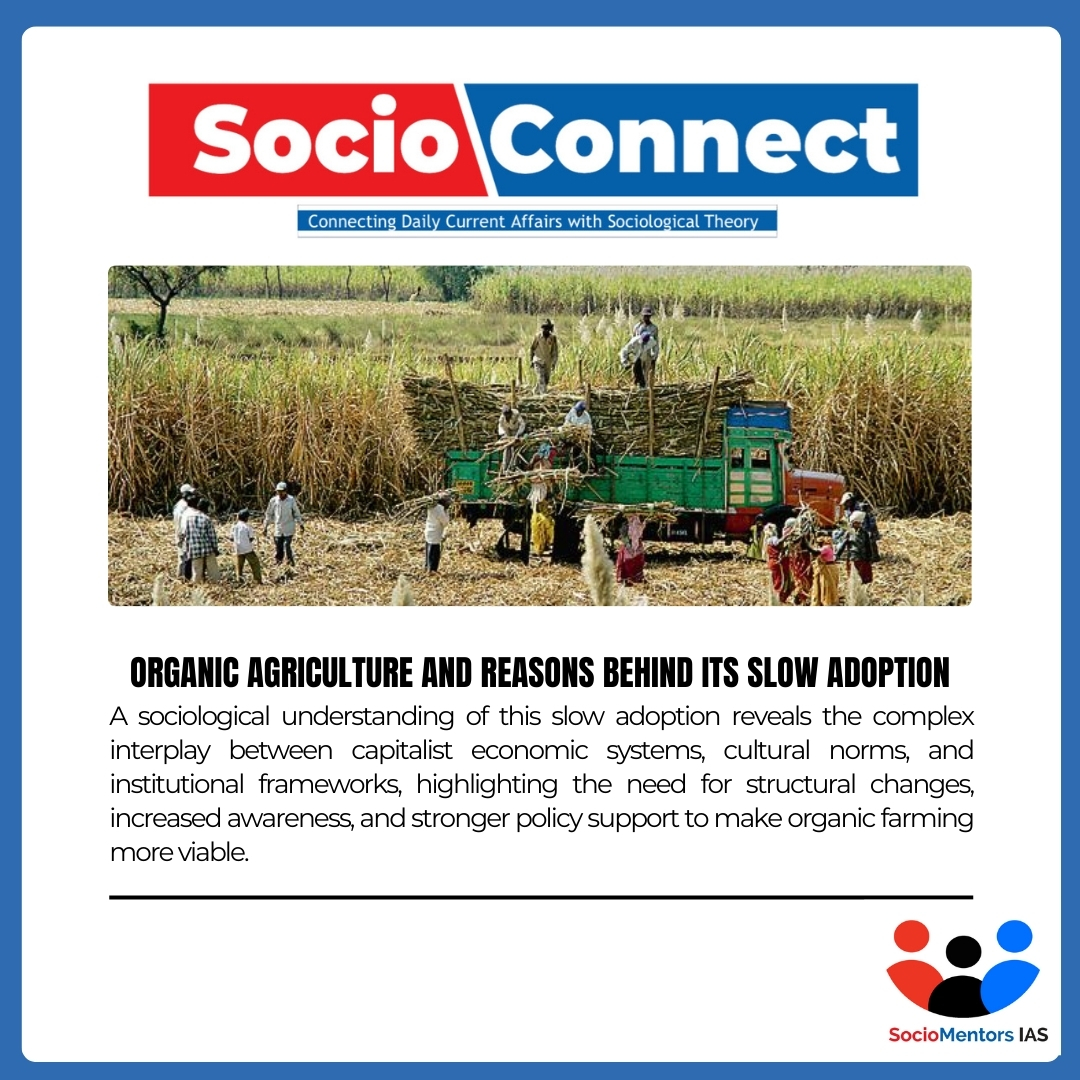Organic Agriculture And Reasons Behind Its Slow Adoption – UPSC Sociological Perspective
September 12, 2024
Organic agriculture is a production system that sustains the health of soils, ecosystem and people. It relies on ecological processes, biodiversity and cycles adopted to local conditions, rather than the use of inputs with adverse effects. Organic agriculture combines tradition, invention and science to benefit the shared environment and promote fair relationships and a good quality of life for all involved.
Sociological Factors Limiting The Performance Of Organic Farming Activities In India:
- Relative Deprivation: Green revolution created and deepened social inequalities between farmers creating an upper class of rich farmers who radically increased productivity and another small and marginal farmer who couldn’t scale up the ladder. In benefitting only, the upper class and upper caste section of the rural population, this agrarian transformation through green revolution proved most adverse to small scale farmers and landless labourers. There is always an aspiration among these farmers to boost productivity which is not favourable through organic farming whose yield is low.
- Economic Factors: Organic farming is characterised by low yield which is not sustainable for small and marginal farmers. Small and marginal farmers cannot take the risk of low yields for the initial 2-3 years on the conversion to organic farming.
-
- There are no schemes to compensate them during the gestation period. The price premiums on the organic products will not be much of help, as they will disappear once significant quantities of organic farm products are made available.
-
- The cost of inputs like organic manures, seeds are also high compared to conventional farming.
-
- The marketing of organic products and their certification is also cumbersome and is still evolving and the small farmers find it unprofitable.
- State Policies: Reddy B highlighted the policies issues and the challenges faced by the farmers. State policies till now increased the dependence of farmers on external input and caused damage to the environment along with high uptake of resources like chemical fertilisers, high intake of water etc. For the farmers to shift to organic farming, new policies by the state should encourage use of locally available resources and use of local traditional knowledge.
- Low education and awareness among farmers: Small and marginal farmers do not have the technical know-how and also awareness about organic farming and its impact on the environment leading to its low adoption.
- Community Influence: Rural communities are often close-knit, and individual decisions around farming are influenced by community opinions. If a majority of farmers in a community use chemical inputs, those interested in organic farming may face social pressure to conform to the status quo. In many rural areas, farming practices are influenced by collective wisdom and peer pressure, making it difficult for individual farmers to adopt organic methods.
- Vested Interests and Pressure Groups: The seed, fertilizer and pesticide industry as also the importers of these inputs to the country have a stake in the conventional farming. Their opposition to organic farming stems from these interests. In the absence of alternative employment opportunities and other considerations, the organized workforce particularly in the public sector fertilizer, pesticide and seed industries is also likely to oppose moves on the part of the government to promote organic farming on a large scale.
- Institutional Barriers: India’s agricultural policies and subsidies have historically favored conventional farming methods, particularly those that promote the use of chemical inputs.
FACTORS PROMOTING ORGANIC FARMING IN INDIA
- Traditional Practises: The traditional wisdom and farming practices of tribal communities can act as a catalyst to spread the growth of organic farming in tribal areas like north eastern states.
- Rising Demand for Organic Products: Urbanization, rising income levels, and increasing awareness about health and sustainability have led to a growing demand for organic products in Indian cities. This demand, in turn, promotes the expansion of organic farming in rural areas. Health-conscious new Indian middle classconsiders consumption of organic products as a part of healthy lifestyle and also as to some extent as a status symbol.
- Religion and farming: Since Hindu religious beliefs considers the basic elements such as jala, bhumi, vayuetc as sacred, organic farming which aims to preserve the above is considered as closer to nature in a religious sense also. Besides the protection offered to cow due to its sacred status can ensure adequate supply of gobar and other manures which are key components of practices such as zero budget natural farming.
- As a response to ecological movement: India has seen several grassroots environmental movements, such as the Chipko Movement and the Narmada Bachao Andolan, which have increased environmental awareness among rural and urban populations. Organic farming is often seen as an extension of these ecological efforts, aimed at preserving natural resources and reducing the harmful impacts of chemical fertilizers and pesticides.Also, organic farming is transitioning into a social movement in itself. It is being taken up by cooperatives, SHGs and individual activists based on ideology of equality, sustainability and anti-corporatization.
The Indian government has launched several schemes and policies to promote organic farming, such as the Paramparagat Krishi Vikas Yojana (PKVY) and the National Programme for Organic Production (NPOP). These programs aim to provide financial assistance, certification support, and market access to organic farmers.
A country like India can enjoy a number of benefits from the adoption of organic farming. The price premiums for the products, conservation of the natural resources in terms of improved soil fertility and water quality, prevention of soil erosion, preservation of natural and agro-biodiversity are major benefits. Economic and social benefits like generation of rural employment, lower urban migration, improved household nutrition, local food security and reduced dependence on external inputs will be large gains in the Indian conditions. The protection of environment and the consequent increase in the quality of human life will be other contributions of organic farming.



